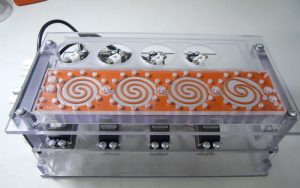CHANDLER – Meet HuMiX, the “gut on a chip” that may lead one day to personalized medical treatments.
Arizona researchers are able to map, isolate and study the interactions between the microbes in your body and your tissues and organs – like the gut – by using a chip half the size of an iPhone 6 Plus.

Multiple tubes are hooked to a HuMix chip to test how various compounds interact in the simulated gastrointestinal environment. (Photo courtesy of Marian Frank/University of Arizona Health Sciences)
Scientists use the swirl-shaped chips to study the interactions between your body and the things that affect it, such as food, medicine and germs.
“We can look at the effect of drugs. We can look at the effect of nutrition,” said Frederick Zenhausern, lead researcher for HuMiX at the University of Arizona. “If you eat too much chocolate, maybe that will have an impact,” he said.
Researchers connect a chip to multiple tubes that feed in compounds, microbes, and tissue samples from the gastrointestinal tract. Then, scientists study the interactions among all the substances, trying to determine the impact on an array of health issues.
The chips may offer answers as simple as figuring out what makes a person have a stomach ache, or as complex as determining whether brain disease, Parkinson’s disease or Alzheimer’s are connected to microbes in the gut.
“In the gut, you have a lot of neurons and nerves that connect with your brain. So maybe that communication between those cells can generate a neurotoxin” that influences the brain, said Zenhausern, director of the university’s Center for Applied NanoBioscience and Medicine.
The potential medical breakthrough could mean individualized medical treatments could replace an all-purpose, one-size-fits all approach to a health issue, researchers said.
“Your body is completely different from my body. So, the probiotics that might improve your digestion might not be so good for me. That’s one potential application,” said Marc Macgiollaeain, a visiting scientist from Luxembourg.